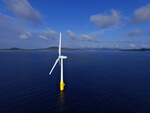News Release from RenewableUK
Wind Industry Profile of
RenewableUK CEO highlights industrial-scale opportunity of floating wind to Welsh Affairs Committee
The Crown Estate has committed to enabling the development of 4GW of floating wind in the Celtic Sea (between Wales, south west England and Ireland) by 2035, with the potential to accommodate a further 20GW by 2045.
In this year’s clean power auctions for Contracts for Difference, UK Ministers ringfenced £24m for floating wind for the first time, enabling the TwinHub project in the Celtic Sea to go ahead. RenewableUK is urging the Government to ensure these annual auctions are designed in a way which secures as much new capacity as fast as possible, as well as building up our supply chain.
Mr McGrail told the committee: “Floating wind is a very big opportunity for global growth and the UK has a leading position in this. As we’ve taken an early mover position, we can establish ourselves as a global leader in this technology, building a new industry here and exporting out technology worldwide”.
The UK Government has set a target of 5GW of floating wind by 2030 and provided £160 for upgrading ports to enable quayside manufacturing for floating wind. Mr McGrail added: “It’s really vital that we build the new port infrastructure we need, but we have quite a slow process in building that infrastructure in this country. We need substantial changes in our port infrastructure to enable floating wind, and there is recognition in Government that that needs to be done, so the £160m funding has to be understood as a first step”.
He also welcomed The Crown Estate’s commitments to enabling the development of floating wind in the Celtic Sea, saying: “The Crown Estate has important job in sending a long-term signal for the future, creating the framework of how we invest in the sector. Setting targets is great, but if you build 4GW you also need to know what’s coming after and when - we need a roadmap for opening up beyond 4GW, optimising leasing rounds to get early investment in the supply chain”.
He highlighted the opportunities to build new factories in Wales and the rest of the UK, and noted that clean power auctions for Contracts for Difference could help to stimulate this: “Building an industry based only on price signals is not the most sustainable pathway. Within that competitive framework, we also need to value economic development, innovation, sustainability, jobs, diversity and community impact - and take that into consideration in CfD auctions. You’ve got to care about price because that matters to consumers and to competitiveness, but valuing other factors is allowed too”.
He concluded by saying that the regulator Ofgem needs a new mandate from the Government to enable new grid infrastructure to be built to accommodate new projects: “We should not underestimate the significance of the challenge of building the grid infrastructure that’s needed. The amount of time that it takes and the complexity from a consenting point of view is significant. But my point would be that Net Zero has been in law since 2019, and the regulator Ofgem still does not have Net Zero in its mandate. If it did, it would be obliged to start thinking about this in a more strategic way - and that needs to be addressed very soon”.
- Source:
- RenewableUK
- Author:
- Press Office
- Link:
- www.renewableuk.com/...
- Keywords:
- RenewableUK, The Crown Estate, Wales, floating offshore, industrial scale, environmental benefit, UK, gigawatts, Minitser




















